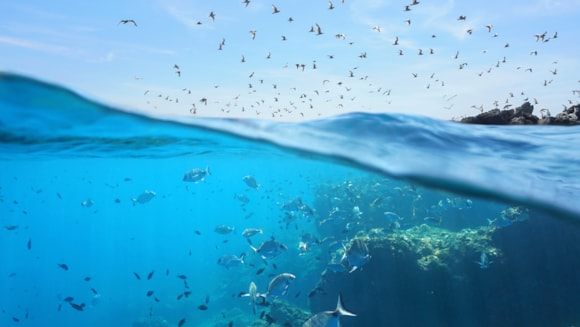The international shipping industry, which carries over 80% of global trade and uses more ocean space than any other sector, is stepping up action to protect the ocean.
This year’s World Maritime Day, observed globally on September 25, focuses on the sector’s impact on the marine environment, and what it can do to reduce pollution, curb greenhouse gas emissions and prevent biodiversity loss.
Secretary-General of the International Maritime Organization Mr. Arsenio Dominguez said: “IMO has, for many decades, worked to strike the right balance to ensure that the shipping industry is not the problem but the solution. Whether it is through international regulations to protect the environment and support seafarers, technical support to Member States, or bringing together all the key stakeholders – governments, industry, academia, civil society – we always find a way to global solutions.”
Mr. Dominguez called for the maritime community to build on the momentum of recent global progress.
This includes the imminent entry into force of the Agreement under the United Nations Convention on the Law of the Sea (UNCLOS) on the Conservation and Sustainable Use of Marine Biological Diversity of Areas beyond National Jurisdiction (BBNJ Agreement, commonly known as the High Seas Treaty), as well as commitments made at the UN Ocean Conference held in Nice in June and ongoing negotiations for a global agreement on plastic pollution.
In his statement, United Nations Secretary-General Mr. António Guterres said: “On this World Maritime Day, let us reaffirm our obligation to safeguard the ocean and those who depend on it. Let us deliver on the Nice outcome, invest in resilient maritime industries … and ensure that the blue economy is a driver of inclusive sustainable development.”
IMO action for the ocean
Under the theme “Our Ocean, Our Obligation, Our Opportunity”, IMO has highlighted actions and progress achieved this year, including:
- Tackling marine plastic pollution: Adoption of the 2025 Action Plan to Address Marine Plastic Litter from Ships in April, aiming to reduce the contribution from shipping and fishing vessels to marine plastic litter.
- Protecting biodiversity: In April, IMO initiated the development of a new legally binding global regulatory framework on biofouling management to combat the spread of invasive aquatic species that may be carried on ships.
- Decarbonization: The draft IMO Net-Zero Framework was approved in April, including regulations for a new global fuel standard and GHG emissions pricing mechanism for ships. The measures are to be discussed for adoption in October 2025.
- Air pollution: The Mediterranean Sea became an Emission Control Area (Med SOx ECA) under the MARPOL Annex VI treaty in May. The sulphur content in fuel oil for ships operating in the area is now limited to 0.1%, significantly reducing air pollution and delivering major benefits to both human health and the marine environment.
- Ship recycling: The Hong Kong International Convention for the Safe and Environmentally Sound Recycling of Ships entered into force in June, aiming to ensure that ships at the end of their operational lives are recycled safely.
- Underwater Radiated Noise (URN): Extension of the GloNoise Project to support Member States’ implementation of IMO’s revised guidelines for the reduction of URN as well as the action plan on preventing URN.
(Ocean image from IMO)


